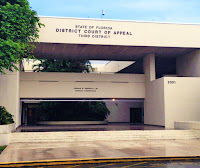Insured Cannot Bring Common Law Claim for Breach of the Implied Warranty of Good Faith and Fair Dealing Separate and Apart From Claim for Statutory Bad Faith
By Karma Hall, Esq.
In Chalfonte Condominium Apartment Association, Inc. v. QBE Insurance Corp., No. SC09-441, (May 31, 2012), the Florida Supreme Court was called upon to decide (among other certified questions*) whether an insured may bring a common law claim for breach of the implied warranty of good faith and fair dealing separate and apart from a claim for statutory bad faith.
The U.S. Court of Appeals for the Eleventh Circuit had
certified questions to the Florida Supreme Court, explaining that “[n]o Florida
court has explicitly held that an insured may bring a claim for breach of the
implied warranty of good faith and fair dealing for an insurer’s failure to
investigate and assess its insured’s claim within a reasonable period of time.”
Chalfonte Condominium Apartment Association, Inc. v. QBE Insurance Corp., 561
F.3d 1267 (11th Cir. 2009). On the other hand, the court noted “[n]or do we
believe that the Florida courts have decisively held that a statutory bad faith
action provides the exclusive remedy for an insurer’s failure to investigate
and assess its insured’s claim within a reasonable period of time.” Still
further, “Florida courts have not determined whether the bifurcation
requirement applicable to statutory bad faith claims also applies to a claim
for breach of the implied warranty of good faith and fair dealing based on an
insurer’s failure to investigate and assess its insured’s claim within a
reasonable period of time.”
The Florida Supreme Court concluded that claims against
insurers for failure to promptly investigate a claim “are actually statutory
bad-faith claims that must be brought under section 624.155 of the Florida
Statutes.” In reaching this result, the
Court acknowledged that Florida contract law recognizes an implied covenant of
good faith and fair dealing in every contract, and noted that this covenant is
intended to protect “the reasonable expectations of the contracting parties in
light of their express agreement.”
Nevertheless, the Court emphasized that it has specifically declined to
adopt the doctrine of reasonable expectations in the context of insurance
contracts, concluding that construing insurance policies under this doctrine
“can only lead to uncertainty and unnecessary litigation.”
The Court mentioned two limitations on claims involving alleged
breach of implied covenant of good faith and fair dealing: “(1) where
application of the covenant would contravene the express terms of the
agreement; and (2) where there is no accompanying action for breach of an
express term of the agreement.” Further, because a statutorily created bad
faith cause of action was created by the Florida legislature in Fla. Stat. §
624.155, the only remedy available is the statutory bad-faith action created by
that statute.
* The Court also held that: an insured cannot bring a claim
against an insurer for failure to comply with the language and type-size
requirements established by Fla. Stat. § 627.701(4)(a); an insurer’s failure to
comply with the language and type-size requirements established in Section
627.701(4)(a) does not render a noncompliant hurricane deductible provision in
an insurance policy void and unenforceable as the legislature has not provided
for this penalty; and a contractual provision mandating payment of benefits
upon “entry of a final judgment” does not waive the insurer’s procedural right
to post a bond and stay the execution of a money judgment pending resolution of
appeal.”
Click to view full opinion.

Comments
Post a Comment